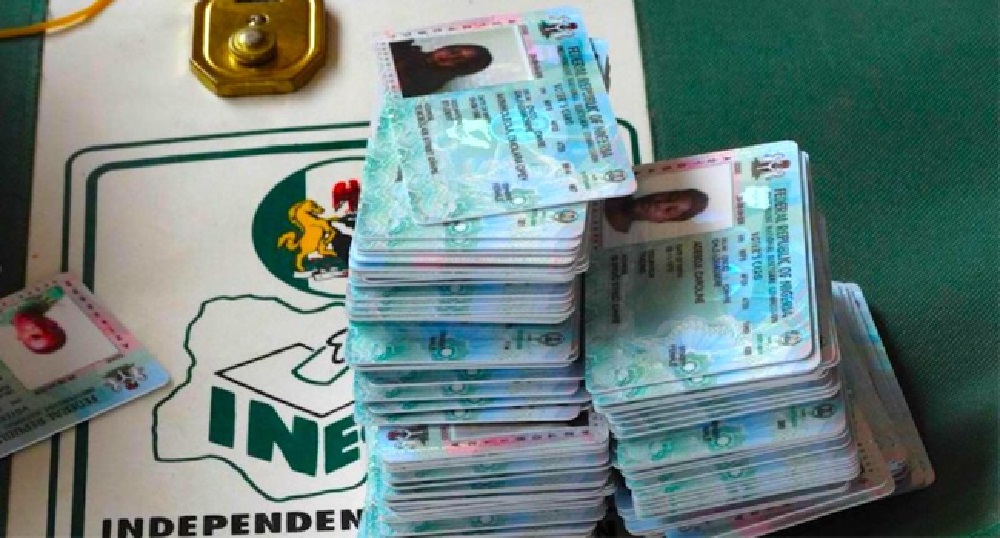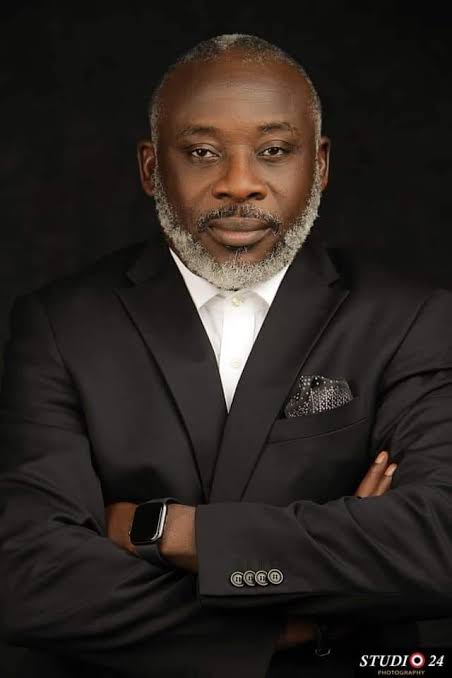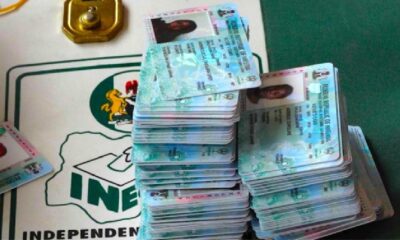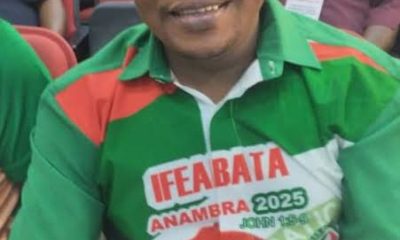News
INEC to destroy over six million uncollected PVCs

The Independent National Electoral Commission is contemplating a policy to withdraw and destroy Permanent Voter Cards that remain uncollected for a decade, The PUNCH has learnt.
This recommendation was among 208 proposals arising from the commission’s review of the 2023 general elections.
The move stemmed from the persistent issue of unclaimed PVCs, with over six million cards still uncollected as of the 2023 elections, including many issued as far back as 2015.
Stakeholders in the post-election review recommended that INEC address the backlog of uncollected PVCs by implementing a policy to withdraw PVCs that remain uncollected for extended periods, starting with cards issued in 2015.
The rationale is that these cards are unlikely to be claimed, and their retention clogs the voter management system.
“Following the publication of the Register of Voters, the commission made available the PVCs for collection by voters on December 12, 2022. The exercise was initially planned to end on the 22nd of January 2023. However, the fact that a huge number of registered voters had yet to collect their PVCs forced the commission to extend the deadline to the 5th of February 2023 after devolving the collection to the ward level between January 6-15, 2023 to ease the process.
“The low rate of PVC collection and other related challenges are illustrative of the problem of processing and managing voters in Nigeria. To increase the rate of collection of PVCs, the commission implemented a policy that made it possible for voters to locate their PVCs online and subsequently pick them up. Several CSOs supported the commission’s drive to increase PVC collection by working with INEC’s state/FCT Offices to record all uncollected PVCs and to inform their owners where and how to collect them.
“With support from the development partners, some of the CSOs also created information centres in selected states and the FCT to assist voters locate and collect their PVCs. Despite these efforts, over six million PVCs remained uncollected, many of them dating back to 2015.
Consequently, one recommendation from the review was that the commission should consider withdrawing PVCs issued in 2015 since it is not clear if the owners will ever collect them,” INEC said.
Also, the commission proposed plans to modernise Nigeria’s electoral process, including the gradual phase-out of PVCs and the introduction of diaspora voting.
It was explained that with the adoption of the Bimodal Voter Accreditation System, PVCs may no longer be necessary for voter accreditation. Instead, voters could use computer-generated slips or credentials downloaded from the commission’s website.
“Unlike the SCR, the voters’ register is now resident in the BVAS. The new device does not read and extract voters’ details from the PVC. Moreover, the Electoral Act 2022 has made biometric accreditation (fingerprint or facial) mandatory for voting.
“The utility of the PVC is now limited to voter identification. It is therefore possible to identify voters using their registration slips which obviates the need for PVCs, the cost of producing them, the logistics for their distribution and the fact that voters without them are unable to vote, thus raising serious issues of disenfranchisement.
With the BVAS, voters can be identified using their registration slips otherwise known as the Temporary Voter’s Card and accredited biometrically without the need for a plastic PVC.
“However, such a step requires the amendment of Section 47(1) of the Electoral Act 2022 which makes the presentation of the card (PVC) to the PO at the PU mandatory before accreditation and voting,” the recommendation said.
Political parties divided
Political parties in the country hold differing opinions about INEC’s plan to destroy uncollected PVCs.
In an interview with The PUNCH, the National Legal Adviser of the Labour Party, Kehinde Edun, believed that the initiative was in order, stressing that there was a need to declutter the voters register, especially if it is confirmed that many of those registered have died.
He said, “I am sure most of those uncollected PVCs must have been as a result of irregularities in the process of registration and all that. If truly people register to vote and register as eligible electorate, they must have collected over a long period, after being given enough time.
“But I believe no system is perfect. So I think destroying them may be in order. If people have not collected over a long period, there is a likelihood those lapses were the result of some irregularities in the process of registration.”
But the Peoples Democratic Party raised a concern that destroying uncollected PVCs could be another ploy by INEC to distract Nigerians.
The PDP Deputy National Youth Leader, Timothy Osadolor, who spoke to The PUNCH, said INEC had given Nigerians enough reasons to be suspicious.
He asserted that people refused to collect the PVCs because they had lost faith in INEC to make their votes count during elections.
Osadolor said, “How do you contemplate destroying cards produced with billions of taxpayers’ money because INEC has failed the credibility and integrity test that has made millions of Nigerians lose faith in the commission’s ability to organise free, fair and credible elections?
“I urge INEC to, as a matter of immediate action, begin an image laundering and rebranding campaign to convince Nigerians and stakeholders that the commission is ready to be truly independent in spelling, actions and character.”
Also, the New Nigeria People’s Party advised INEC to reconsider the plan to destroy PVCs.
The National Publicity Secretary of the NNPP, Ladipo Johnson, said destroying over six million voter cards would amount to sheer waste of money.
He said, “If people register and haven’t come to collect over a long period of time unless they know those people have passed on, I think the cards should not be destroyed as long as they are in safekeeping.
“If you destroy about six million PVCs, and all of a sudden, some of the owners show up and want to vote, it will cost God-knows-how-much to register them again. It’s a waste of money.”
SANs back INEC
However, some Senior Advocate of Nigeria, who spoke to The PUNCH backed INEC to destroy the uncollected PVCs, asserting that there are no legal impediments.
A former Chairman of the Presidential Advisory Committee Against Corruption, Prof. Itse Sagay (SAN), said some of the uncollected PVCs were likely products of double registration.
“They (uncollected PVCs) are taking space. My suspicion is that the owners don’t exist. It is double fraudulent registration by a lot of people. Just as I am sure that we are not up to 200 million neither do I believe that we are up to 90 million registered voters when only 20 percent of that is always voting. There is a lot of fake information and fake facts in this country and I’m sure this is part of it. So, let them destroy the uncollected PVCs,” he said.
Sharing a similar view, another SAN, Sam Erugo, said, “The PVCs have been uncollected over time, so I don’t see anything wrong in them destroying them because not collecting them means something is definitely wrong with the owners. Either they are dead or they are duplication. Now, that brings the question whether eligible voters have voters card or that will will impede their right to vote or not.
That is a different question altogether but if they have uncollected voter cards, of course, they have a right to destroy them because that will help stop people from using them to rig elections. Given that they are uncollected, they are useless already and money has been wasted already.”
But Paul Obi (SAN) differed, calling for greater awareness instea of rushing to destroy the PVCs.
“What is the basis for destroying six million voters cards?” he queries. “Even if they are uncollected, they belong to Nigerians who are also supposed to use them in the next election and they spent money in producing them.
“I think greater awareness should be created for people who own those PVCs to collect them. It doesn’t make sense spending money and next time they will still have to produce PVCs for those people who own them. More awareness should be done for collection,” he said.
Credit: PUNCH
News
Just in: PDP can never die over gale of defection -Hon Teejay Yusuf insists

… PDP is going into extinction-Awwal
Ex-House of Representatives member, Hon Teejay Yusuf has insisted that the Peoples Democratic Party, PDP can never go into extinction even with one serving governor.
Recall that Governor of Delta State, Hon Sheriff Oberovwori and his immediate past principal and running mate to PDP’s flag bearer, Senator Ifeanyi Okowa defected to the ruling party, All Progressives Congress APC on Wednesday.
Teejay Yusuf, a vibrant and never say die three-term lawmaker while appearing on Channels tv on Thursday morning did not mince words when he declared that the PDP will bounce back soon.
Countering this position, an APC chieftain, Hassan Awwal said the PDP was going into extinction and by 2027 may not have more than one governor.
Teejay Yusuf also rubbished this position declaring that with even just one governor, the PDP will bounce back into the mainstream.
Giving instances of parties like CPC, ACN, APGA and others that had one governor but never died.
Details shortly….
News
Court orders 54 banks to return N9.3bn stolen by hackers

Justice Deinde Dipeolu of the Federal High Court in Lagos has ordered 54 banks to immediately return a total of N9,329,322,870 fraudulently transferred by hackers from an unnamed old generation bank.
The judgment, delivered on April 15, 2025, follows an ex parte motion filed in suit number FHC/L/CS/629/2025.
The court directed the financial institutions to place a Post No Debit restriction on all accounts that received the stolen funds and to begin the immediate return of all available funds to the originating bank.
The plaintiff bank reported that on March 23, 2025, a breach in its core banking system resulted in unauthorised debits from multiple customer accounts.
The stolen funds—amounting to over N9.3bn—were then dispersed across accounts in 54 financial institutions.
Upon detection of the incident, the bank said it promptly alerted the institutions involved and began tracking the disbursements.
The investigation revealed that the funds were transferred in multiple tranches from the bank into primary accounts and subsequently rerouted to other accounts held by secondary and tertiary beneficiaries.
Justice Dipeolu ruled that the affected banks must provide details of the implicated accounts, including balances and amounts already transferred.
The judge further ordered the immediate return of all recoverable funds to the plaintiff bank.
The financial institutions are also to share comprehensive customer data related to the transactions, including names and destination accounts.
Restrictions are to be maintained on all accounts that received any portion of the funds until full recovery is made, limited to the amount each received.
The judge clarified that the ruling applies strictly to erroneously transferred funds and does not infringe on other customer deposits.
“For the avoidance of doubt and for clarity, the order is only in respect of funds erroneously transferred and sums salvaged,” the ruling emphasised.
Justice Dipeolu concluded that the stolen funds “belong to the plaintiff and not the customers of the respondent banks,” affirming the court’s authority to direct full restitution.
News
US indicts Nigerian for $690k scam, false citizenship claim

A Nigerian-born United States citizen, Oladapo Fadugba, risks 27 years imprisonment over his alleged involvement in a $690,000 wire fraud scheme and making false declarations to obtain US citizenship.
PUNCH Metro learnt this in a statement by the US Attorney for the District of Florida, Gregory Kehoe, obtained on Wednesday.
According to Kehoe, Fadugba was indicted for multiple charges, including wire fraud, aggravated identity theft, and making false statements during his naturalisation process.
According to Kehoe, between October 2020 and July 2023, the suspect allegedly diverted $690,000 in funds belonging to the US Department of Veterans Affairs, which was meant for reimbursement to a major local healthcare provider.
It was further alleged that Fadugba used another person’s identity to facilitate the transfers into various bank accounts under his control.
The statement read, “According to the indictment, beginning on October 30, 2020, and ending no later than July 11, 2023, Fadugba had more than $690,000 of Department of Veterans Affairs funds, intended for reimbursement to a large local healthcare provider, transferred to his personal bank accounts.
“Fadugba then wrote cheques to himself or to businesses associated with him, which were subsequently transferred to other bank accounts under his control. It is alleged that he used the identification of another individual to carry out these transfers.”
In addition, Fadugba is accused of lying under oath during his US naturalisation proceedings by falsely stating that he had never committed a crime for which he had not been arrested.
Kehoe stated that, if the suspect was convicted on all counts, he risked a maximum sentence of 27 years in the US federal prison and the forfeiture of $400,000, representing proceeds from the alleged crimes.
“The indictment further alleges that Fadugba, a naturalised US citizen from Nigeria, made a false statement under oath during his naturalisation proceedings by claiming he had not committed any offence or crime for which he had not been arrested.
“If convicted on all charges, Fadugba faces up to 27 years in federal prison. The indictment also includes a notice that the United States is seeking a forfeiture order of $400,000, which reflects the approximate proceeds of the criminal conduct charged,” the statement added.
Kehoe concluded by noting that “an indictment is merely a formal accusation of criminal conduct, and every defendant is presumed innocent unless and until proven guilty.”
PUNCH Metro reported on April 12 that a 24-year-old Nigerian man, Mercy Ojedeji, pleaded guilty to charges of wire fraud and unlawful use of fraudulent immigration documents in the United States.
According to a statement released by the U.S. Attorney’s Office for the Eastern District of Missouri, the plea was entered in a US District Court in St. Louis, Missouri.
Ojedeji had admitted to fraudulently securing a student visa and gaining admission into the University of Missouri’s chemistry PhD program in Fall 2023.
He acknowledged using falsified academic transcripts, recommendation letters, a fake resume, and a fabricated English language proficiency report to obtain the visa.
Credit: PUNCH
-

 News23 hours ago
News23 hours agoBREAKING! Gov Oborevwori finally dumps PDP
-

 News20 hours ago
News20 hours agoDelta to transform into complete APC state as 25 PDP Local Government Chairmen set to defect
-

 News9 hours ago
News9 hours agoINSECURITY! Enough is enough, Tinubu tells security chiefs, NSA
-

 News8 hours ago
News8 hours agoINEC moves to legalise voting without PVC
-

 News9 hours ago
News9 hours agoJust in: Air Peace suspends all scheduled flights nationwide
-

 News20 hours ago
News20 hours agoMoji Danisa to Be Honoured by NUJ FCT for Her Impact in Tabloid Journalism
-

 News4 hours ago
News4 hours agoJust in: PDP can never die over gale of defection -Hon Teejay Yusuf insists
-

 News23 hours ago
News23 hours agoJust in: “We don’t need Emergency Rule, save us from armed herdsmen”- Gov Alia begs TInubu

















